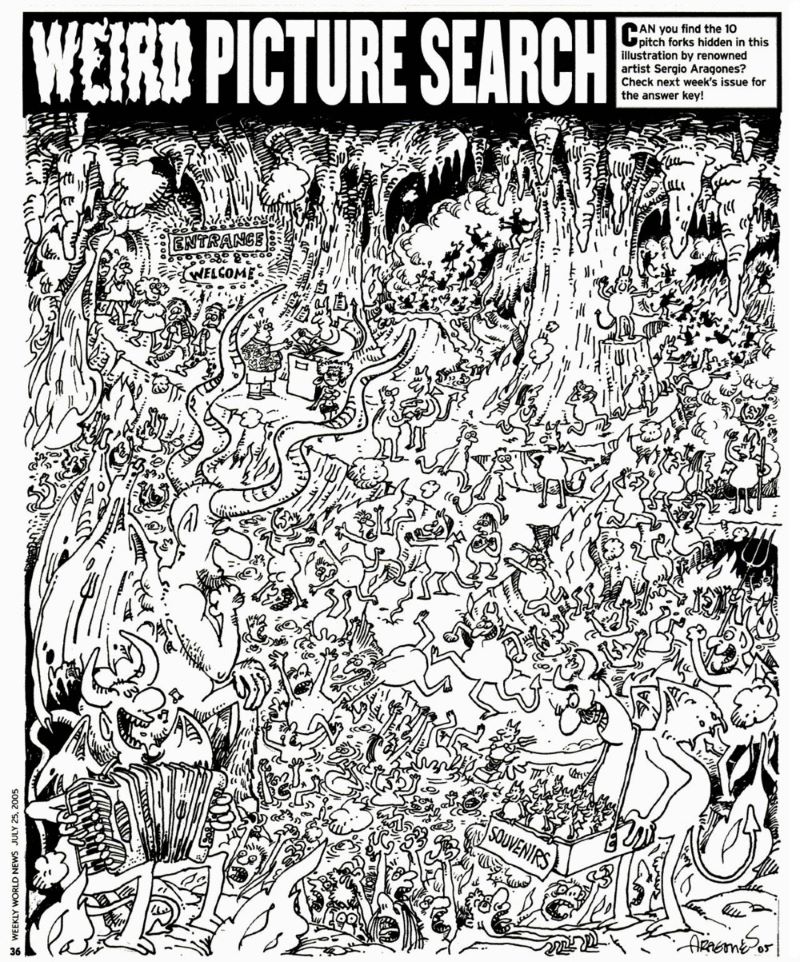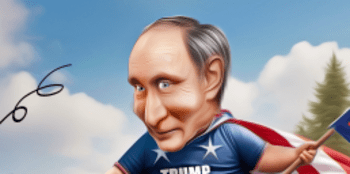The Monday Muster
Skip to commentsSergio Aragonés at Weekly World News; David Ostow on TV; Grant Geissman, EC Comics historian; Behind the Scenes of Early Animation; Thumbs Up AND Thumbs Down on Firing Michael Leunig; and George Herriman Specialty Krazy Kay Original Art!
Sergio Aragonés’ Weekly Comic for a Major Newspaper
From 2005 to 2007 “MAD cartoonist Sergio Aragonés did full-page cartoons for WEEKLY WORLD NEWS in his intricate and wall-to-wall, top-to-bottom art style, with every square inch presenting something funny.”

Hairy Green Eyeball 3 presents 12 pages of Sergio’s Weird Picture Search.
In a bit smaller size, with a bit less definition, Paul Kupperberg, who was an editor at Weekly World News, gives us another 13 pages at the 13th Dimension site with a bit more history about the feature:
Each week, Sergio would create a new “Where’s Waldo”-like scene crammed full of tiny, funny figures in typical Aragonés style with a common theme and 10 hidden objects for the reader to find. I was an editor on WWN from early 2006 to the bitter end in August 2007 and we never knew what Sergio was going to send us, but hilarity always ensued because it takes a big man like Sergio Aragonés to make all those tiny little drawings so funny.
**********


In a three minute segment New Yorker cartoonist David Ostow tells Michelle Park of Channel 4 (WNBC-New York) all about his journey to working for The New Yorker, and where he finds inspiration and live draws a cartoon.
**********
Grant Geissman, The Historian of EC Comics
In 1964 you came across the first Ballantine EC books. What was it that stood out for those? What was the process of even finding those books in 1964?
In San Jose there was a place called Town & Country Village, a really nice outdoor mall, and one of the stores in there was called Books, Inc. [where] I would find MAD paperbacks: The MAD Reader, MAD Strikes Back, all the early Ballantine ones, plus the Signet ones that were coming out at the time. So sometime at the end of ‘64, I went in, and sitting there right next to those MAD paperbacks was the Ballantine Tales from the Crypt paperback. I picked it up and immediately realized this connected to MAD in some way, since it had Jack Davis art. The second volume was Tales of the Incredible, it had some other MAD artists, Wally Wood, Joe Orlando. And reading an EC story, it was light years away from Superman and Batman, which are really pretty sanitized. ‘Imaginary’ stories like “Superman marries Lois Lane,” and stuff like that. For the next couple years a new Ballantine EC-related paperback would come out, there were five of them in all, and I was hooked.



For The Comics Journal Joseph Antoniello interviews MAD and EC Comics fan and historian Grant Geissman.
**********
Cartoons About Cartoons (Part 1)
Animation is a medium that has fascinated and dazzled the eyes of audiences for over a century. The novelty of seeing line drawings move, seemingly under ther own power, was something akin to magic when it first appeared – only slightly more magical than the innovation of the motion picture itself, which already had performed miracles in allowing the relatively new industry of photography to take on the illusion of displaying life-like movement, even if prone to flicker and lack of smoothness of action between frames.
Amid all this atmosphere of magic and mystery, many early animators decided that the time was right to let audiences in on their little game – sort of. For the most part, the industry was far from ready to yet display documentary-style presentations of the behind-the-scenes hell or humdrum of real-life animators, such as would begin to occur in the 1930’s with shorts such as Cartoonland Mysteries, or the extravaganza of in-house footage that would become Disney’s The Reluctant Dragon in the 1940’s. Instead, studios decided to play on the public’s imaginations of what might be going on within an animation studio, by developing fanciful depictions of an animator’s life, where creations of the pen spring off the drawing board, interact with their bosses, and wreak havoc upon the real world at the drop of a hat.



In his Animation Trails column for Cartoon Research Charles Gardner looks at early animated films that give audiences hints at what goes on behind the scenes in cartoon studios of the time.
We’ll not attempt to itemize all instances of mere violations of physical rules – otherwise, we might have to critique every cartoon ever made. Our focus instead will be on films that exhibit either character self-consciousness of being drawn, or break the fourth wall to expressly remind the audience that the story you are about to see is false, not to be confused with anything else that may be observed on your planet.
**********
Should we mourn the axing of Michael Leunig?
After 55 years at The Age, Michael Leunig filed his final cartoon for the newspaper last week after he was fired by Nine in what he described as “a throat-cutting exercise”. The popular cartoonist has been declared an Australian Living Treasure, but has also drawn ire over the decades for various controversies including his critique of working mothers who use childcare and taking an anti-vaccination stance.


No, we shouldn’t mourn the axing of Leunig — it’s time to let go of toxic nostalgia
‘Like many of his generation, perhaps the most privileged in the history of the Western world, Leunig’s career inscribes an arc from anti-capitalist, individualistic politics to anti-woke warrior.’
Yes, we should mourn the axing of Leunig — he’s the last of the Magnificent Seven
‘His work was a soft and comforting relief from most of the day’s news. I cannot remember censoring a single Leunig cartoon and nor would I have censored any of the cartoons that upset his recent editors.’
Crikey presents “today’s Friday Fight, former editor of The Age Michael Smith argues in the affirmative, and The Saturday Paper’s arts editor Alison Croggon argues in the negative.”
**********
Krazy Kat Specialty Illustration Original Art by George Herriman
What a “family” portrait! George Herriman’s beloved Krazy Kat characters line up to say “Helloi Lady!” in this charming ink and watercolor on Bristol board illustration. From left to right, that’s Joe Turkil (we think), Gooseberry Sprig, Offisa Bull Pupp (billy club in hand), Water Cephus Austrige (with Ignatz Mouse resting on one of his feet), Joe Stork (with his bundle by his side), and Krazy Kat, holding a red parasol. The artboard measures 8″ x 10″.

Yours for $55,000.00! Check it out at Albert Moy Original Comic Art.

and more information at downthetubes


Comments 3
Comments are closed.